https://www.pressreader.com/south-afric ... 5113033373
Human-Wildlife Conflict
-
Klipspringer
- Global Moderator
- Posts: 5862
- Joined: Sat Sep 14, 2013 12:34 pm
- Country: Germany
- Contact:
- Lisbeth
- Site Admin
- Posts: 67388
- Joined: Sat May 19, 2012 12:31 pm
- Country: Switzerland
- Location: Lugano
- Contact:
Re: Human/Wildlife Conflict
Roaming lion tracked down
Zululand Observer - Monday2 Mar 2020 | Larry Bentley
EZEMVELO KZN Wildlife officials were activated on Wednesday after reports of a male lion roaming the farms in the False Bay area near Hluhluwe.
The lion was located, darted and euthanised by a vet on Thursday.
It is believed the lion, brought in from Namibia some time ago, was ousted from the pride and found its way out of the Hluhluwe-iMfolzoi Park’s Manzibomvu section.
No reports of livestock having been preyed upon by the lion were received.
The incident is being investigated by the authorities.
"Education is the most powerful weapon which you can use to change the world." Nelson Mandela
The desire for equality must never exceed the demands of knowledge
The desire for equality must never exceed the demands of knowledge
-
Klipspringer
- Global Moderator
- Posts: 5862
- Joined: Sat Sep 14, 2013 12:34 pm
- Country: Germany
- Contact:
Re: Human Wildlife Conflict
https://lowvelder.co.za/627129/elephant ... ied-fence/
Elephants power through electrified fence
The animals’ lives remain a top priority for the volunteer group that, only a week ago, relocated them to a secure property.
June 22, 2020
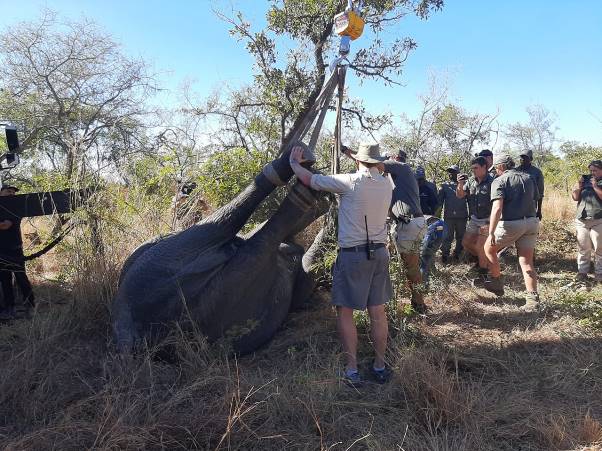
After a massive collaborative effort to relocate five elephants to a secure private reserve in the Hectorspruit area, the animals regrettably broke through an electrified fence on Saturday evening.
This came after an extensive relocation operation that took place on June 14. Prior to the relocation, the elephants were roaming a number of unsecure farms, putting their lives and those of community members at risk.
This, paired with the risk of vehicles colliding with the animals as they were crossing a number of roads, prompted the relocation.
It is believed that they came from a private reserve south of Hectorspruit, in close proximity to the Kruger National Park.
The elephants were initially moved approximately eight kilometres away to a secure property, managed by the Strauss family and the Eco Ranger Group.
However, after their escape, they found their way back to the neighbouring property from which they were originally relocated.
Dereck Milburn and the Wildlife Emergency Fund, a new organisation specialising in the rescue of animals in Africa that are at imminent risk of danger, worked in close collaboration with elephant translocation expert, Kester Vickery and his team from Conservation Solutions.
Seasoned veterinarians, Dr Peter Rogers of Provet Wildlife Services, and Dr Dave Cooper of African Wildlife Vets, both provided vital support on the ground as well.
Jana Meyer, a specialist wildlife helicopter pilot of Hope for Wildlife Helicopter Services, did some phenomenal work in the air to ensure the elephants were safely darted.
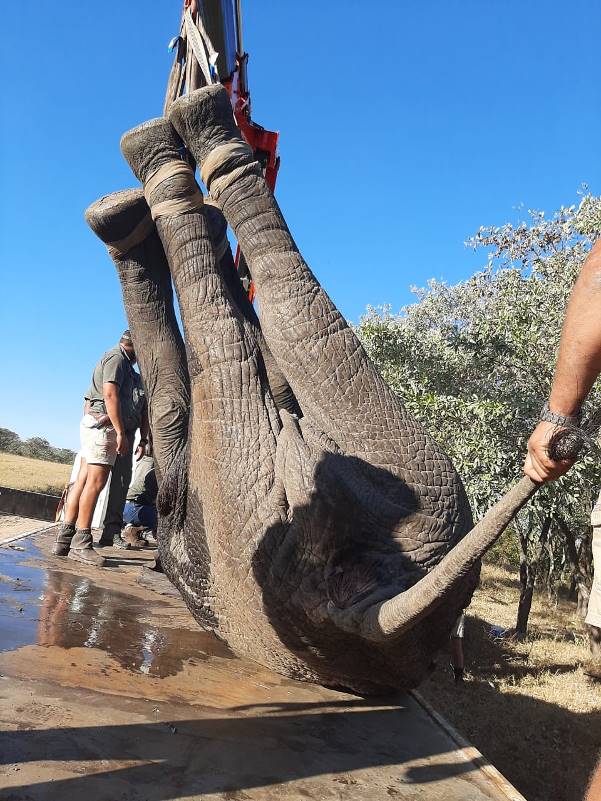
Milburn said, “Despite the successful translocation and the monitoring by the rangers on the ground, the elephants managed to break through the electrified perimeter of the reserve where they were released.
“We are now working on alternative solutions to secure them, as their safety and that of the surrounding community is our core priority. Rangers are monitoring them and the Strauss family is working around the clock to secure their lives.”
The initial relocation was put together in approximately 48 hours thanks to combined efforts from as far as Johannesburg and KwaZulu-Natal.
Besides this weekend’s escape, it is safe to say the operation ran smoothly and the Strauss family and the team of volunteers are still confident they can find a permanent solution for the elephants’ safety.
The Mpumalanga Tourism and Parks Agency did its part in providing the necessary permits for the first relocation, and Milburn said they look forward to working with it again to ensure the best outcome for the animals.
“We, as volunteers in this project, remain 100 per cent committed to these gentle giants and finding a solution for them.”
Elephants power through electrified fence
The animals’ lives remain a top priority for the volunteer group that, only a week ago, relocated them to a secure property.
June 22, 2020

After a massive collaborative effort to relocate five elephants to a secure private reserve in the Hectorspruit area, the animals regrettably broke through an electrified fence on Saturday evening.
This came after an extensive relocation operation that took place on June 14. Prior to the relocation, the elephants were roaming a number of unsecure farms, putting their lives and those of community members at risk.
This, paired with the risk of vehicles colliding with the animals as they were crossing a number of roads, prompted the relocation.
It is believed that they came from a private reserve south of Hectorspruit, in close proximity to the Kruger National Park.
The elephants were initially moved approximately eight kilometres away to a secure property, managed by the Strauss family and the Eco Ranger Group.
However, after their escape, they found their way back to the neighbouring property from which they were originally relocated.
Dereck Milburn and the Wildlife Emergency Fund, a new organisation specialising in the rescue of animals in Africa that are at imminent risk of danger, worked in close collaboration with elephant translocation expert, Kester Vickery and his team from Conservation Solutions.
Seasoned veterinarians, Dr Peter Rogers of Provet Wildlife Services, and Dr Dave Cooper of African Wildlife Vets, both provided vital support on the ground as well.
Jana Meyer, a specialist wildlife helicopter pilot of Hope for Wildlife Helicopter Services, did some phenomenal work in the air to ensure the elephants were safely darted.

Milburn said, “Despite the successful translocation and the monitoring by the rangers on the ground, the elephants managed to break through the electrified perimeter of the reserve where they were released.
“We are now working on alternative solutions to secure them, as their safety and that of the surrounding community is our core priority. Rangers are monitoring them and the Strauss family is working around the clock to secure their lives.”
The initial relocation was put together in approximately 48 hours thanks to combined efforts from as far as Johannesburg and KwaZulu-Natal.
Besides this weekend’s escape, it is safe to say the operation ran smoothly and the Strauss family and the team of volunteers are still confident they can find a permanent solution for the elephants’ safety.
The Mpumalanga Tourism and Parks Agency did its part in providing the necessary permits for the first relocation, and Milburn said they look forward to working with it again to ensure the best outcome for the animals.
“We, as volunteers in this project, remain 100 per cent committed to these gentle giants and finding a solution for them.”
- Lisbeth
- Site Admin
- Posts: 67388
- Joined: Sat May 19, 2012 12:31 pm
- Country: Switzerland
- Location: Lugano
- Contact:
Re: Human-Wildlife Conflict
Close Encounters of the Fourth Kind: Limpopo farmers consume marauding elephants
By Lucas Ledwaba for Mukurukuru Media• 9 July 2020
Rangers shoot down four elephants in human-wildlife conflict, but this is of little help to farmers helpless against the giants of Africa. (WARNING: Graphic images)
When rangers shot and killed four elephants on the outskirts of Gumbu recently, villagers celebrated by cutting off chunks from the carcasses to eat and share with their domestic animals.
Gumbu is located west of Pafuri, the Kruger National Park’s northernmost gate and south of the Limpopo river. Elephant herds are believed to be marching between Zimbabwe and South Africa in their daily search for food and water. The farming village offers easy pickings for the giants who bulldoze over the fences with ease.
For ages, the giant mammals have been troubling the community of farmers who live along the Limpopo river which forms the international border with Zimbabwe. Now it was the farmers turn to eat their crop-destroying nemesis.
A Gumbu resident hangs slices of meat from elephants killed near the village in anticipation of enjoying the delicacy in the coming weeks. (Photo: Lucas Ledwaba / Mukurukuru Media)
When rangers from the Limpopo Department of Environmental Affairs were called in last week after unusually frequent raids by the animals, the villagers found a rare cause for celebration. Four of the animals were tracked down to the north of the village by armed rangers.
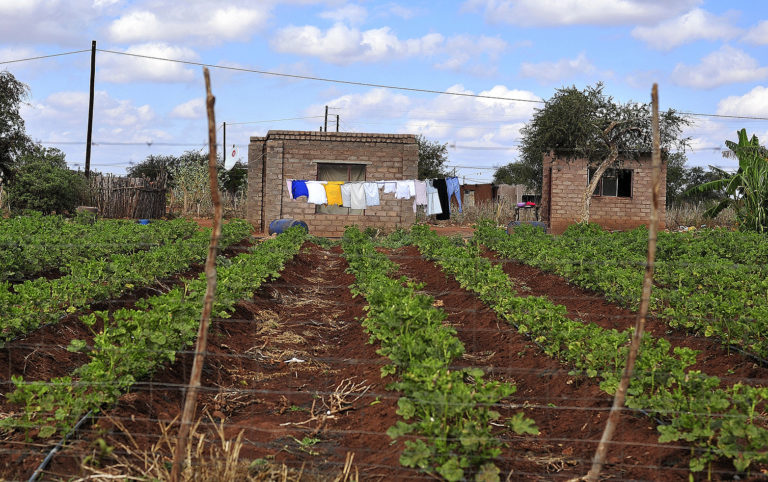
Gumbu is a village of small-scale commercial farmers who sell their produce at markets in Gauteng and Limpopo. (Photo: Lucas Ledwaba / Mukurukuru Media)
“It was a war out here,” said Mahwasane Mudzweda, chairperson of the Vhembe Communal Property Association who witnessed the operation.
“They shot one elephant. Then the three others were trying to rescue it. They were fighting. They were fighting to pull the shot elephant from the ground and also fighting back. But the rangers showed their experience,” Mudzweda said.
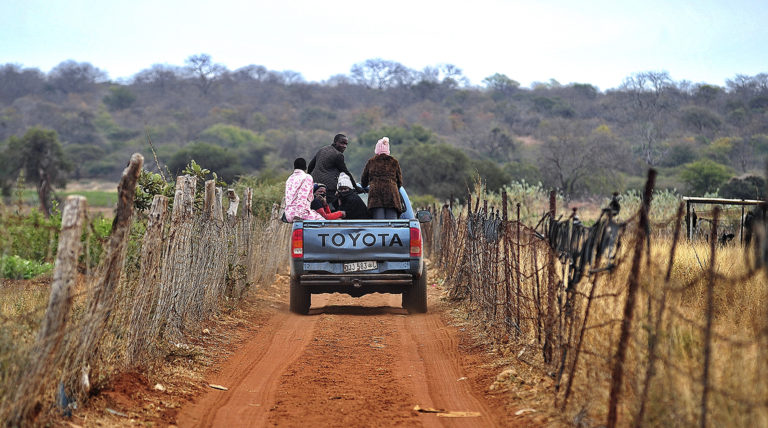
Farmers do their rounds to check for damage on their farms. (Photo: Lucas Ledwaba / Mukurukuru Media)
When word reached the village about 3km away, farmers broke out in celebration and headed for the spot where the four giants lay dead in a heap. After the rangers removed the tusks for safekeeping, knives and axes and saws went to work as village elders skinned the animals and cut off chunks of meat to take back to the village to share among the people. Excited people sliced up the meat into pieces, salted it and hung it to dry.
But the celebration was short-lived. Just a day after the shooting another herd of elephants staged one of their destructive overnight raids.
“They were here again last night,” Pfarelo Mudau exclaimed angrily as she walked among her crops where the animals had left huge marks in the ground after stepping on the neat rows of okra and uprooting many of the plants.
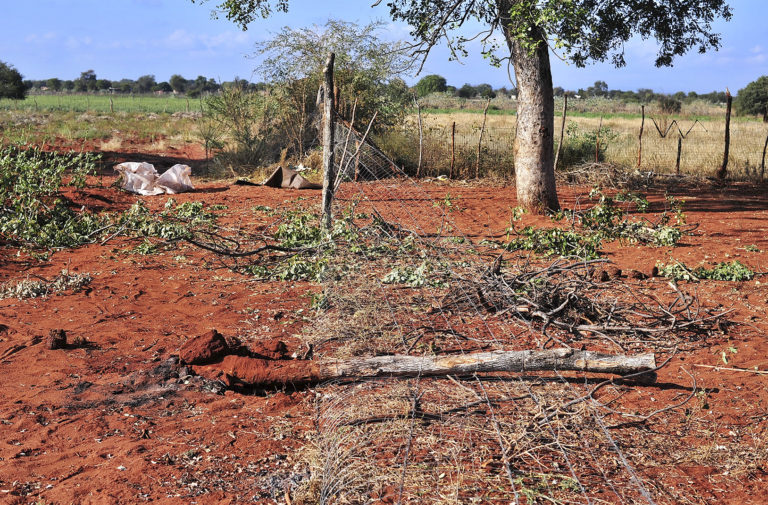
Flattened fences after another visit by elephants. (Photo: Lucas Ledwaba / Mukurukuru Media)
The jumbos made nothing of the wire fences erected around the farms to keep away domestic and small animals. They broke down fence poles, trampled over the fences to gain entry onto the farms. There, they feasted on ripening crops of okra, spinach, cabbage and paprika. They ripped up irrigation pipes, probably hoping to quench their thirst.
All around the farmlands, despairing farmers walked around counting the costs while some were hard at work trying to repair the damage caused to the boundaries by elephants. The damage by elephants has added to the losses the farmers suffered as a result of the prolonged Covid-19 lockdown. Due to the lockdown, they could not work the land as they normally do and transporting their produce proved difficult and expensive.
Mudau runs Top Supreme Farming with her husband Phathutshedzo Munyai, selling their produce in the Johannesburg Fresh Produce Market, among other outlets. Just one elephant raid on the 2ha farm sets them back thousands of rand. Months of hard work go into the jumbos’ stomachs.
The farmers are so terrified of the elephants that as soon as dusk falls they make for home to avoid an encounter with these gods of Africa. They have tried numerous tactics to scare them off, such as burning tyres in strategic places around the more than a dozen farms and planting chillies along the fences. In some parts of Africa, farmers have even set up bee fences [setting up bee colonies along fences] and developed non-lethal guns to “bomb” the elephants. But all this has yielded no solution – the jumbos just trample their way to the crops and water sources.
But the elephant problem is not only a challenge faced by the people of Gumbu. The Food and Agriculture Organisation of the United Nations noted that human-wildlife conflicts have become more frequent and severe over recent decades.
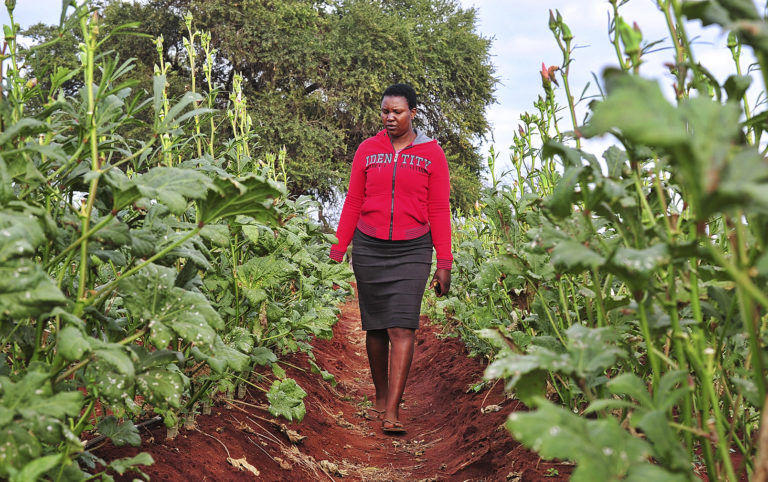
Farmer Pfarelo Mudau says the damage caused by elephants on the farm she shares with her husband runs into thousands of rands. (Photo: Lucas Ledwaba / Mukurukuru Media)
The world body cited human population growth, the extension of transport routes and the expansion of agricultural and industrial activities which together have led to increased human encroachment on previously wild and uninhabited areas as some of the reasons.
Climate change, which has led to low rainfall levels and a decline in natural food and water sources, has been identified as one of the key reasons exacerbating the human-wildlife conflicts.
Zaid Kalla, spokesperson for the Limpopo Department of Economic Development, Environment and Tourism said they have entered into a formal co-operation agreement to deal and manage destruction causing animals in the western boundary of the Kruger National Park.
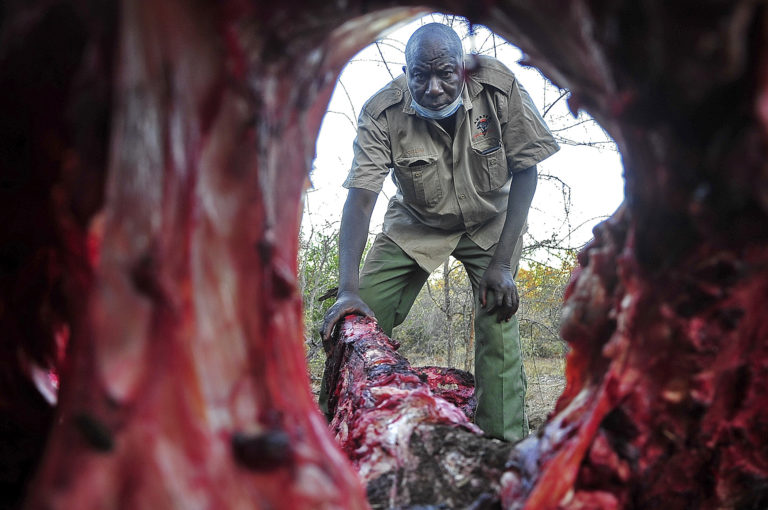
Vhembe Communal Property Association chairperson Mahwasane Mudzweda inspects the site where four elephants were shot by rangers.( Photo: Lucas Ledwaba/Mukurukuru Media)
However, he said claimants “will in all instances have to prove that the damage causing animals actually came from the [Kruger] National Park.
“If it is clear that it came from the National Park, SANParks will have to investigate the matter and establish if all reasonable measures have been taken to prevent animals from escaping from the park,” he said.
Kalla said although damage causing animals compensation protocol guidelines state that only livestock loss can be compensated while agricultural crops are excluded which are damaged regularly by elephants and buffaloes break-outs.
“SANParks undertakes to pay compensation for damages attributed to the actions of wild dog, cheetah, hyena, lion, buffalo and elephant subject to certain conditions as outlined in these guidelines specifically focusing on the loss of livestock."
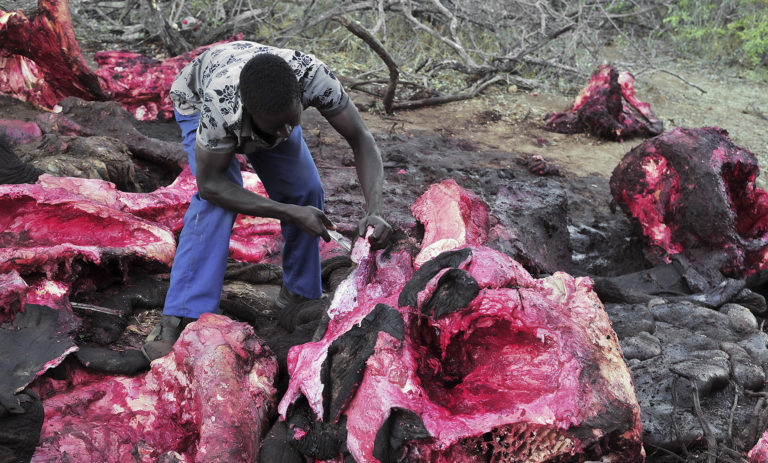
Mashudu Mbengwa cutting meat to take home. ( Photo: Lucas Ledwaba/Mukurukuru Media)
He said SANParks has a responsibility to compensate communities where it is certain that animals are from a national park caused damage to the community.
“Communities or farmers must report all escaping animals to the relevant LEDET officials immediately they spot them without taking laws in their own hands as this might cause much harm to human lives as well.”
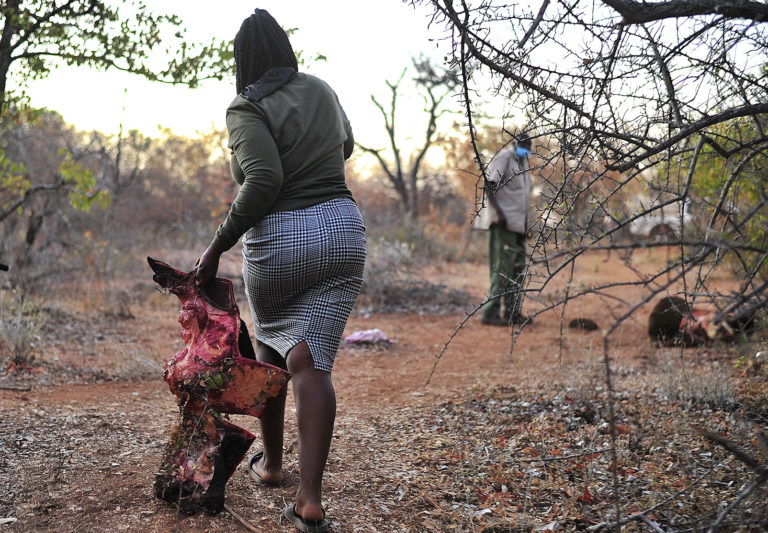
A Gumbu resident leaves with meat to feed her dogs. (Photo: Lucas Ledwaba / Mukurukuru Media)
A recent report study by the organisation Elephants Without Borders in neighbouring Botswana found that elephants were more likely to pass by fields with solar-powered strobe light barriers during a two-year study involving 18 farmers in Chobe. The recently released study is titled Panic at the disco: Solar-powered strobe light barriers reduce field incursion by African elephants Loxodonta africana in Chobe District, Botswana . The country has the world’s largest elephant population estimated at more than 200,000.
“Although elephants were more likely to pass by fields with solar-powered strobe light barriers (which was probably a result of selection bias as we focused on fields that had previously been damaged by elephants), they were less likely to enter these treatment fields than control fields without such barriers. Our findings demonstrate the efficacy of light barriers to reduce negative human-elephant interactions in rural communities.” (Adams et al 2020)
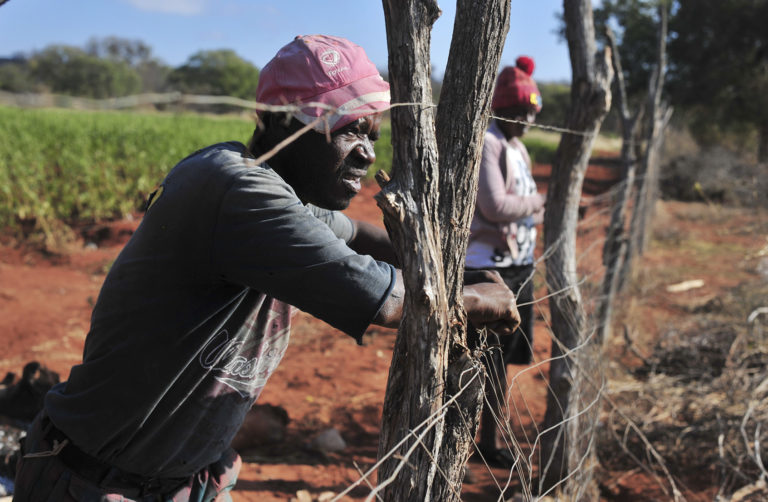
Farmer Vengani Ndou, whose property was damaged by elephants, says they try to scare them away by making fires on the farms, but the tactic doesn’t help. (Photo: Lucas Ledwaba / Mukurukuru Media)
“We must just keep on doing this, fixing our fences and strengthening them. Maybe if the rangers are located nearby that can also help us… the truth is that nothing can stop an elephant,” Vengani Ndou said, fixing a fence which had been struck down by elephants.
But why don’t the farmers gang up and spend some nights on the fields to chase the elephants away by making noise and throwing fire at them like they do in some parts of Kenya and Botswana?
“Eh! Do you know an elephant? We will all be dead. Nothing can stop an elephant. It can even run faster than a car. What is a human being compared to an elephant? It will kill you,” Ndou said. DM/MC Mukurukuru Media
By Lucas Ledwaba for Mukurukuru Media• 9 July 2020
Rangers shoot down four elephants in human-wildlife conflict, but this is of little help to farmers helpless against the giants of Africa. (WARNING: Graphic images)
When rangers shot and killed four elephants on the outskirts of Gumbu recently, villagers celebrated by cutting off chunks from the carcasses to eat and share with their domestic animals.
Gumbu is located west of Pafuri, the Kruger National Park’s northernmost gate and south of the Limpopo river. Elephant herds are believed to be marching between Zimbabwe and South Africa in their daily search for food and water. The farming village offers easy pickings for the giants who bulldoze over the fences with ease.
For ages, the giant mammals have been troubling the community of farmers who live along the Limpopo river which forms the international border with Zimbabwe. Now it was the farmers turn to eat their crop-destroying nemesis.
A Gumbu resident hangs slices of meat from elephants killed near the village in anticipation of enjoying the delicacy in the coming weeks. (Photo: Lucas Ledwaba / Mukurukuru Media)
When rangers from the Limpopo Department of Environmental Affairs were called in last week after unusually frequent raids by the animals, the villagers found a rare cause for celebration. Four of the animals were tracked down to the north of the village by armed rangers.

Gumbu is a village of small-scale commercial farmers who sell their produce at markets in Gauteng and Limpopo. (Photo: Lucas Ledwaba / Mukurukuru Media)
“It was a war out here,” said Mahwasane Mudzweda, chairperson of the Vhembe Communal Property Association who witnessed the operation.
“They shot one elephant. Then the three others were trying to rescue it. They were fighting. They were fighting to pull the shot elephant from the ground and also fighting back. But the rangers showed their experience,” Mudzweda said.

Farmers do their rounds to check for damage on their farms. (Photo: Lucas Ledwaba / Mukurukuru Media)
When word reached the village about 3km away, farmers broke out in celebration and headed for the spot where the four giants lay dead in a heap. After the rangers removed the tusks for safekeeping, knives and axes and saws went to work as village elders skinned the animals and cut off chunks of meat to take back to the village to share among the people. Excited people sliced up the meat into pieces, salted it and hung it to dry.
But the celebration was short-lived. Just a day after the shooting another herd of elephants staged one of their destructive overnight raids.
“They were here again last night,” Pfarelo Mudau exclaimed angrily as she walked among her crops where the animals had left huge marks in the ground after stepping on the neat rows of okra and uprooting many of the plants.

Flattened fences after another visit by elephants. (Photo: Lucas Ledwaba / Mukurukuru Media)
The jumbos made nothing of the wire fences erected around the farms to keep away domestic and small animals. They broke down fence poles, trampled over the fences to gain entry onto the farms. There, they feasted on ripening crops of okra, spinach, cabbage and paprika. They ripped up irrigation pipes, probably hoping to quench their thirst.
All around the farmlands, despairing farmers walked around counting the costs while some were hard at work trying to repair the damage caused to the boundaries by elephants. The damage by elephants has added to the losses the farmers suffered as a result of the prolonged Covid-19 lockdown. Due to the lockdown, they could not work the land as they normally do and transporting their produce proved difficult and expensive.
Mudau runs Top Supreme Farming with her husband Phathutshedzo Munyai, selling their produce in the Johannesburg Fresh Produce Market, among other outlets. Just one elephant raid on the 2ha farm sets them back thousands of rand. Months of hard work go into the jumbos’ stomachs.
The farmers are so terrified of the elephants that as soon as dusk falls they make for home to avoid an encounter with these gods of Africa. They have tried numerous tactics to scare them off, such as burning tyres in strategic places around the more than a dozen farms and planting chillies along the fences. In some parts of Africa, farmers have even set up bee fences [setting up bee colonies along fences] and developed non-lethal guns to “bomb” the elephants. But all this has yielded no solution – the jumbos just trample their way to the crops and water sources.
But the elephant problem is not only a challenge faced by the people of Gumbu. The Food and Agriculture Organisation of the United Nations noted that human-wildlife conflicts have become more frequent and severe over recent decades.

Farmer Pfarelo Mudau says the damage caused by elephants on the farm she shares with her husband runs into thousands of rands. (Photo: Lucas Ledwaba / Mukurukuru Media)
The world body cited human population growth, the extension of transport routes and the expansion of agricultural and industrial activities which together have led to increased human encroachment on previously wild and uninhabited areas as some of the reasons.
Climate change, which has led to low rainfall levels and a decline in natural food and water sources, has been identified as one of the key reasons exacerbating the human-wildlife conflicts.
Zaid Kalla, spokesperson for the Limpopo Department of Economic Development, Environment and Tourism said they have entered into a formal co-operation agreement to deal and manage destruction causing animals in the western boundary of the Kruger National Park.

Vhembe Communal Property Association chairperson Mahwasane Mudzweda inspects the site where four elephants were shot by rangers.( Photo: Lucas Ledwaba/Mukurukuru Media)
However, he said claimants “will in all instances have to prove that the damage causing animals actually came from the [Kruger] National Park.
“If it is clear that it came from the National Park, SANParks will have to investigate the matter and establish if all reasonable measures have been taken to prevent animals from escaping from the park,” he said.
Kalla said although damage causing animals compensation protocol guidelines state that only livestock loss can be compensated while agricultural crops are excluded which are damaged regularly by elephants and buffaloes break-outs.
“SANParks undertakes to pay compensation for damages attributed to the actions of wild dog, cheetah, hyena, lion, buffalo and elephant subject to certain conditions as outlined in these guidelines specifically focusing on the loss of livestock."

Mashudu Mbengwa cutting meat to take home. ( Photo: Lucas Ledwaba/Mukurukuru Media)
He said SANParks has a responsibility to compensate communities where it is certain that animals are from a national park caused damage to the community.
“Communities or farmers must report all escaping animals to the relevant LEDET officials immediately they spot them without taking laws in their own hands as this might cause much harm to human lives as well.”

A Gumbu resident leaves with meat to feed her dogs. (Photo: Lucas Ledwaba / Mukurukuru Media)
A recent report study by the organisation Elephants Without Borders in neighbouring Botswana found that elephants were more likely to pass by fields with solar-powered strobe light barriers during a two-year study involving 18 farmers in Chobe. The recently released study is titled Panic at the disco: Solar-powered strobe light barriers reduce field incursion by African elephants Loxodonta africana in Chobe District, Botswana . The country has the world’s largest elephant population estimated at more than 200,000.
“Although elephants were more likely to pass by fields with solar-powered strobe light barriers (which was probably a result of selection bias as we focused on fields that had previously been damaged by elephants), they were less likely to enter these treatment fields than control fields without such barriers. Our findings demonstrate the efficacy of light barriers to reduce negative human-elephant interactions in rural communities.” (Adams et al 2020)

Farmer Vengani Ndou, whose property was damaged by elephants, says they try to scare them away by making fires on the farms, but the tactic doesn’t help. (Photo: Lucas Ledwaba / Mukurukuru Media)
“We must just keep on doing this, fixing our fences and strengthening them. Maybe if the rangers are located nearby that can also help us… the truth is that nothing can stop an elephant,” Vengani Ndou said, fixing a fence which had been struck down by elephants.
But why don’t the farmers gang up and spend some nights on the fields to chase the elephants away by making noise and throwing fire at them like they do in some parts of Kenya and Botswana?
“Eh! Do you know an elephant? We will all be dead. Nothing can stop an elephant. It can even run faster than a car. What is a human being compared to an elephant? It will kill you,” Ndou said. DM/MC Mukurukuru Media
"Education is the most powerful weapon which you can use to change the world." Nelson Mandela
The desire for equality must never exceed the demands of knowledge
The desire for equality must never exceed the demands of knowledge
- Richprins
- Committee Member
- Posts: 75966
- Joined: Sat May 19, 2012 3:52 pm
- Location: NELSPRUIT
- Contact:
Re: Human-Wildlife Conflict
the truth is that nothing can stop an elephant,
A war indeed!
There is an overabundance of elephant, so no problem with the culling!
A war indeed!
There is an overabundance of elephant, so no problem with the culling!
Please check Needs Attention pre-booking: https://africawild-forum.com/viewtopic.php?f=322&t=596
- Lisbeth
- Site Admin
- Posts: 67388
- Joined: Sat May 19, 2012 12:31 pm
- Country: Switzerland
- Location: Lugano
- Contact:
Re: Human-Wildlife Conflict
I am a bit ashamed, but that was my first thought 
"Education is the most powerful weapon which you can use to change the world." Nelson Mandela
The desire for equality must never exceed the demands of knowledge
The desire for equality must never exceed the demands of knowledge
-
Klipspringer
- Global Moderator
- Posts: 5862
- Joined: Sat Sep 14, 2013 12:34 pm
- Country: Germany
- Contact:
Re: Human-Wildlife Conflict
A lot of elephants come also from Zimbabwe. The boarder is not fenced for the largest part.
Big problems there indeed for farmers.
Big problems there indeed for farmers.
- Lisbeth
- Site Admin
- Posts: 67388
- Joined: Sat May 19, 2012 12:31 pm
- Country: Switzerland
- Location: Lugano
- Contact:
Re: Human-Wildlife Conflict
Certainly, the fences that they build would not resist anybody even less an elephant, if the idea is to get a bite of the goodies 
"Education is the most powerful weapon which you can use to change the world." Nelson Mandela
The desire for equality must never exceed the demands of knowledge
The desire for equality must never exceed the demands of knowledge
- Richprins
- Committee Member
- Posts: 75966
- Joined: Sat May 19, 2012 3:52 pm
- Location: NELSPRUIT
- Contact:
Re: Human-Wildlife Conflict
The Kruger fence is not elephant proof either, in most sections! 
Please check Needs Attention pre-booking: https://africawild-forum.com/viewtopic.php?f=322&t=596
- Lisbeth
- Site Admin
- Posts: 67388
- Joined: Sat May 19, 2012 12:31 pm
- Country: Switzerland
- Location: Lugano
- Contact:
Re: Human-Wildlife Conflict
That's why they manage to escape, but I don't think it can be compared to the ones above  The park ought to pay for the damage or for decent fences
The park ought to pay for the damage or for decent fences 
"Education is the most powerful weapon which you can use to change the world." Nelson Mandela
The desire for equality must never exceed the demands of knowledge
The desire for equality must never exceed the demands of knowledge


